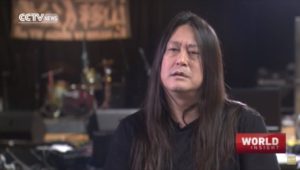
Western analysts have been criticizing China’s One Belt, One Road initiative with loads of negative comments. Time to take a more positive approach, says China veteran and rock star Kaiser Kuo, after discussing the issue with many former US leaders, at SupChina.
Kaiser Kuo:
There are, of course, reasons for skepticism. But there’s no danger, at least among pundits in the West, that anyone has been so beguiled by Xi Jinping’s grand plan that they believe it to be rooted in altruism. Some fret that the debt burden on recipient countries will be crippling. Others see China’s inroads as the thin edge of a neocolonial wedge. Most agree that the Belt and Road brand — and it is, very clearly, a kind of branding exercise — is so capacious that it’s nearly meaningless, and that local officials and SOE bosses can slap the B&R label on any old project. And many Chinese are wary of this largesse when China itself hasn’t even joined the ranks of middle-income countries on a per capita basis. And then there’s the propaganda around the initiative, most of which has been downright silly, some of it risibly so (see this compilation of videos for a few examples).
Skepticism is healthy, until you pile on so much of it that any fair appraisal becomes impossible. My worry is that the U.S. is nearing that point. Already, we’ve blundered in our approach to what might be the most important of the Belt and Road initiatives: the Asia Infrastructure Investment Bank (AIIB). A number of our recent guests on Sinica, including Nye, former U.S. trade representative Charlene Barshefsky, Acting Assistant Secretary of State for East Asia and Pacific Affairs Susan Thornton, and former deputy assistant secretary of state for East Asian and Pacific affairs Susan Shirk, have all spoken of the U.S. effort to dissuade allies from joining AIIB as a mistake. Concerns over governance and lending standards may have been well founded, but the Obama administration’s negativity toward AIIB foreclosed a chance for constructive participation and proved to be a diplomatic embarrassment.
In a recent interview with Nathan Gardels of The World Post, the former Singaporean diplomat Kishore Mahbubani addressed the inevitability of an end to American primacy, urging the U.S. to accept its eventual fate with more grace than it’s shown, and to “abandon its destructive policies of unilateralism and start a new era of constructive policies of multilateralism.” Xi Jinping’s signature initiative offers an opportunity for just such multilateralism. “If the U.S. wants to be really cunning,” Mahbubani said, “it should seize the many business opportunities that the ‘One Belt, One Road’ initiative will eventually offer. Pragmatism and common sense should replace ideology and pride in American thinking of China.”
Sure, Belt and Road might not end up being a “Marshall Plan without a war,” as one analyst called it. Marshall Plan comparisons, though, are ubiquitous — and they are not coming from China. Indeed, China’s official Xinhua News Agency has bluntly rejected the comparison, noting that the Marshall Plan was about Cold War–era containment of Soviet power, whereas China’s Belt and Road initiative “aims at achieving the common development of all countries rather than seeking spheres of political influence.” Perhaps those who have praised Belt and Road as an ingenious way for China’s bloated SOEs to fob off their excess capacity are underestimating the scale of overcapacity, or overestimating Asia’s appetite for new infrastructure. It’s possible, if not indeed likely, that some of the many projects lumped under Belt and Road may prove to be costly boondoggles.
With Charles Kindleberger’s warning firmly in mind, the best response on the part of the U.S. and its allies should be neither to sneer nor to blithely cheer, but to offer constructive guidance and encouragement — and to make sure that, to the highest extent possible, all the roads, rail lines, ports, and pipelines do indeed function as public goods.
Belt and Road would have fared better, as my colleague Jeremy has pointed out, under its original moniker — the “New Silk Road.” That name would have carried a positive historical valence that evokes in particular a historical period from which contemporary China could take real inspiration: the Tang dynasty. Ask any educated Chinese person about that dynasty — one that likely ranks at or near the top of the list of great epochs of Chinese history — and they’ll tell you that the reason for the Tang’s greatness was its openness and cosmopolitanism. Tang is a way for Chinese to reconcile national greatness with internationalism, with globalization. I’m told that this formulation worked for a certain Chinese heavy metal band.
Now if there were only such a period that American leaders could invoke…
Kaiser Kuo is a speaker at the China Speakers Bureau. Do you need him at your meeting or conference? Do get in touch or fill in our speakers’ request form.
Are you looking for more experts on China’s outbound investments? Do check out this list.



